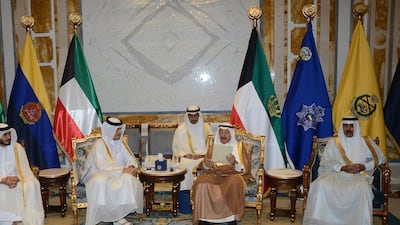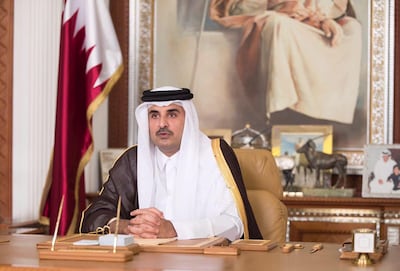On June 5, the UAE, Saudi Arabia, Bahrain and Egypt unexpectedly severed diplomatic ties with Qatar, sending shockwaves through the Middle East, and around the world.
What emerged over the following months was a slow trickle of information on what caused the relationship breakdown and the largest diplomatic upheaval inside the GCC since its inception.
So what exactly caused the rift, and how did it happen? Here, we look at the different parties involved, the powers at play, and what it could mean for the future of the region.
WHO?:
The UAE, Saudi Arabia, Bahrain and Egypt are the quartet of countries leading the boycott against Qatar. The countries, with the exception of Egypt, are part of the Gulf Cooperation Council, an economic union set up in 1981, which also includes Oman, Qatar and Kuwait.
Kuwait has been the main mediator in the dispute with Qatar and has acted as the intermediary for each side. Oman has also sought to mediate.
Qatar, the country at the centre of the crisis, has denied all allegations directed at it since day one.
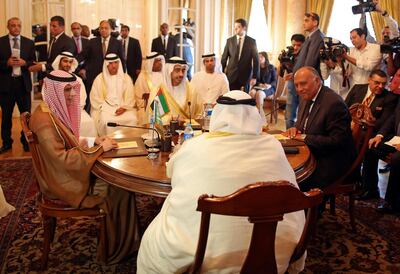
WHY?:
On June 5, the UAE, Saudi Arabia, Bahrain and Egypt abruptly announced they were severing diplomatic ties with Qatar over its funding of terrorism and ties to extremist groups. The final straw seemed to be a pro-Iran speech Qatar emir Sheikh Tamim gave which appeared on the state news agency - but Sheikh Tamim denies making the comments, claiming he was targeted in a hacking operation. Among other remarks, he praised Hamas and labelled Iran an "Islamic power".
Hussein Ibish outlined the underlying issues in a column for The National, saying that while many parts of the international community believed the crisis to be merely a parochial and petty "spat" between local rivals - it was really a profound ideological clash.
"This complex dynamic reflects a profound and region-wide ideological struggle being waged in three key areas of the Arab world: Qatar in the Gulf, Gaza in the Levant, and Libya in North Africa," he wrote.
The crux of the dispute is down to Qatar's foreign policy, which has infuriated other Arab states. Qatar has supported the Muslim Brotherhood and other Islamist groups, particularly during and after the Arab Spring uprisings. The emirate says the Muslim Brotherhood is no "terrorist group", and strongly denies any links to ISIL or Al Qaeda. Al Jazeera Arabic, the Qatar-based broadcaster, has long been accused of providing a platform for extremist groups.
The other major issue is Qatar's relationship with Iran, which differs from that of other GCC countries who accuse Tehran of attempting to destabilise the Gulf and the wider region.
While it seemed to be a snap decision to boycott Qatar, the political rift has been growing for years. In May 2014, the UAE, Saudi Arabia and Bahrain recalled their ambassadors from Doha in a protest against its interference in their internal affairs. They asked Qatar "not to support any party aiming to threaten security and stability of any GCC member". They also disagreed with its policy on Egypt, where Doha supported the deposed Islamist president Mohammed Morsi. The GCC resolved that diplomatic crisis by signing an accord, known as the Riyadh Agreement, that outlined steps to fight terrorism and stop interfering in each others domestic affairs. However, the quartet says that Qatar subsequently did not fulfill its obligations according to the agreement signed in Riyadh.
WHAT? - THE DEMANDS
On June 23, the quartet imposed 13 demands on Qatar. They are:
1. Curb diplomatic ties with Iran and close its diplomatic missions there. Expel members of Iran's Revolutionary Guard from Qatar and cut off any joint military cooperation with Iran. Only trade and commerce with Iran that complies with US and international sanctions will be permitted.
2. Sever all ties to terrorist organisations, specifically the Muslim Brotherhood, ISIL, Al Qaeda, and Hizbollah. Formally declare those entities as terrorist groups.
3. Shut down Al Jazeera and its affiliate stations.
4. Shut down news outlets that Qatar funds, directly and indirectly, including Arabi21, Rassd, Al Araby Al Jadeed and Middle East Eye.
5. Immediately terminate the Turkish military presence currently in Qatar and end any joint military cooperation with Turkey inside Qatar.
6. Stop all means of funding for individuals, groups or organisations that have been designated as terrorists by Saudi Arabia, the UAE, Egypt, Bahrain, the US and other countries.
7. Hand over terrorist figures and wanted individuals from Saudi Arabia, the UAE, Egypt and Bahrain to their countries of origin. Freeze their assets, and provide any desired information about their residency, movements and finances.
8. End interference in sovereign countries' internal affairs. Stop granting citizenship to wanted nationals from Saudi Arabia, the UAE, Egypt and Bahrain. Revoke Qatari citizenship for existing nationals where such citizenship violates those countries' laws.
9. Stop all contacts with the political opposition in Saudi Arabia, the UAE, Egypt and Bahrain. Hand over all files detailing Qatar's prior contacts with and support for those opposition groups.
10. Pay reparations and compensation for loss of life and other, financial losses caused by Qatar's policies in recent years. The sum will be determined in coordination with Qatar.
11. Align itself with the other Gulf and Arab countries militarily, politically, socially and economically, as well as on economic matters, in line with an agreement reached with Saudi Arabia in 2014.
12. Agree to all the demands within 10 days of it being submitted to Qatar, or the list becomes invalid. The document doesn't specify what the countries will do if Qatar refuses to comply.
13. Consent to monthly audits for the first year after agreeing to the demands, then once per quarter during the second year. For the following 10 years, Qatar would be monitored annually for compliance.
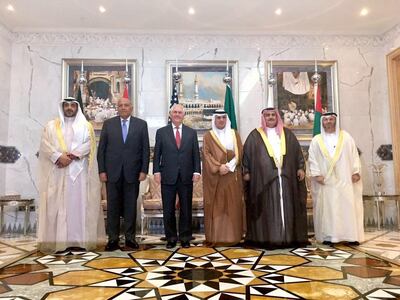
THE PRINCIPLES
At the July 5 meeting in Cairo, the quartet delivered six principles that should form the basis of any attempts to resolve the dispute. They are:
1. Commitment to combat extremism and terrorism in all its forms and to prevent their financing or the provision of safe havens.
2. Prohibiting all acts of incitement and all forms of expression which spread, incite, promote or justify hatred and violence.
3. Full commitment to Riyadh Agreement 2013 and the supplementary agreement and its executive mechanism for 2014 within the framework of the Gulf Cooperation Council (GCC) for Arab States.
4. Commitment to all the outcomes of the Arab-Islamic-US Summit held in Riyadh in May 2017.
5. To refrain from interfering in the internal affairs of States and from supporting illegal entities.
6. The responsibility of all States of international community to confront all forms of extremism and terrorism as a threat to international peace and security."
THE IMPLICATIONS:
Aside from the obvious - restrictions on travel and trade between the countries - the implications over an extended crisis in the region are far-reaching and various.
"The current rift is unprecedented in the diplomatic history of the GCC," Dr Albadr Al Shateri, politics professor at the National Defence College, told The National in June. "The isolation of Qatar by the major GCC countries is far-reaching and will affect Qatar negatively - Qatari nationals will not be able to perform Hajj or Umra without prior approval from the Saudi authorities, neither will they be able to visit Dubai, a Gulf-favoured tourist destination, without a UAE visa."
Top UAE officials have questioned the future validity of the GCC should the crisis continue and questioned whether Qatar would remain a member.
TIMELINE OF EVENTS:
- June 5: The UAE, Saudi Arabia, Bahrain, and Egypt broke diplomatic ties with Qatar on Monday and cut off air, sea and land routes over Doha's support for "terrorist groups aiming to destabilise the region". Remarks attributed to Qatar emir Sheikh Tamim were said to have sparked the crisis, in which he allegedly praised Hamas and labelled Iran an "Islamic power" - but the Qatari government claims it was the victim of a hacking operation. Qataris are given 14 days to leave the countries, and diplomats 48 hours. Gulf airlines suspended all flights to and from Qatar.
- June 8: The UAE bans all international flights serving Doha from flying through its airspace, expanding on an earlier ban on direct flights between the five countries.
- June 11: Exceptions are made on humanitarian grounds for some Qatari residents who have been ordered to leave - including spouses.
- June 23 - Arab countries issue a 13-point list of demands to end the crisis, insisting that Doha curb diplomatic ties with Iran and sever all ties terrorist organisations, specifically the Muslim Brotherhood, and close Al Jazeera. Qatar is given a 10-day deadline to comply.
- July 1 - Qatar says it will reject the demands, with foreign minister Sheikh Mohammed bin Abdulrahman claiming the grievances were aimed at undermining his country's sovereignty and not combating terrorism.
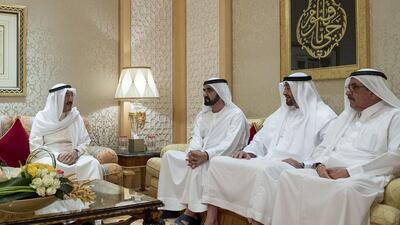
- July 3 - The quartet accepts a request by the emir of Kuwait to extend the deadline for Qatar to meet its demands by 48 hours. German's foreign minister Sigmar Gabriel arrives in Abu Dhabi to speak on the Qatar crisis.
- July 5 - Kuwait delivers Qatar's rejection of the demands. Rating agency Moody's downgrades Qatar's outlook to negative from stable, because of what it regards as an increased probability that the country's dispute with some of its neighbours will not be solved quickly. Foreign ministers from the quartet meet in Cairo and issue six principles Qatar needs to heed to end crisis.
- July 7 - Qatar is warned by the Arab states of further measures over failure to meet demands.
- July 8 - British foreign minister Boris Johnson travels to Kuwait and Riyadh, the latter in which he met Sheikh Mohammed bin Zayed, Crown Prince of Abu Dhabi and Deputy Supreme Commander of the Armed Forces and the Saudi Crown Prince, Mohammed bin Salman.
- July 11 - Documents leaked to CNN outline agreements from Gulf meetings in 2013 and 2014 - further clarifying the strong actions taken against Qatar, and contradict Doha's repeated denials of understanding what was at the heart of the current diplomatic crisis.
- July 12 - US secretary of state Rex Tillerson also joins mediation efforts, meeting the foreign ministers of Saudi Arabia, the UAE, Egypt and Bahrain in Jeddah.
- July 16 - French foreign minister Jean-Yves Le Drian meets Sheikh Mohammed in Abu Dhabi amid the diplomat's tour of the Gulf.
- July 17 - Senior officials deny a report in the Washington Post that alleges the UAE orchestrated a purported hack of Qatari state media that sparked the crisis. The same day, Egypt announces it is ending visa-free travel for Qatari citizens.
- July 19 - The four Arab countries reiterate their call for Doha to agree to a framework of six broad "principles" which they say will set the parameters for future talks on how the crisis is resolved
- July 20 - Omar Ghobash, the UAE's ambassador to Russia, says Qatar tipped off Al Qaeda fighters about a UAE military operation in Yemen, enabling them to carry out a suicide bomb attack injuring Emirati soldiers. He said the discovery of the incident was among the factors behind the decision to cut ties with Qatar.
- July 21 - Qatar announces changes to its anti-terror legislation - establishing two national lists for individuals and terrorist entities and setting out the requirements for being included on them. The UAE says it is "a step in the right direction" towards addressing the concerns of its neighbours.
- July 22 - In his first public remarks since the crisis began, Sheikh Tamim calls for negotiations to resolve differences. "The time has come for us to spare the people from the political differences between the governments," he said. The UAE reacted with scepticism, with The UAE's Minister of State for Foreign Affairs, Dr Anwar Gargash, taking to Twitter to express his disappointment at the emir's first utterances throughout the crisis.
- July 26 - Dr Gargash appears to close the door on mediation efforts to resolve the Doha crisis, saying "we have to go on without Qatar"
- July 27 - Qatar hires a firm founded by a former aide to Donald Trump to counter Saudi Arabia's lobbying efforts in Washington.
- July 30 - The quartet stand firm by their decision to continue boycotting Qatar during a meeting in Bahrain, saying they are willing to re-establish dialogue with Doha only if it adheres to regional and international agreements as well as the demands and principles issued by the quartet. However, they say they will allow Qatari planes to use air corridors in emergencies. Saudi Arabia's foreign minister then says Qatar's calls to "internationalise" the management of holy sites in Mecca and Medina was a declaration of war.
- August 6 - Qatar considers opening up trade routes through Iran to bring in Turkish products and circumnavigate a boycott by Arab countries. Israel plans to ban Al Jazeera.
- August 7 - Qatar and Turkey have staged joint military exercises near Doha after Turkey's parliament fast-tracked legislation on June 7 to allow hundreds of troops to be deployed to a military base near the Qatari capital.
- August 8 - Qatar's banks have their outlook downgraded to negative from stable by Moody's Investor Service amid weakening operating conditions and continued funding pressures facing lenders. The same day, a Kuwaiti delegation of high-ranking royal family members is sent across the region to deliver letters written by Kuwait's ruler in the latest bid to end the crisis.
- August 10 - Retired US general Anthony Zinni and deputy assistant secretary of state for Arabian Gulf Affairs Timothy Lenderking arrive in Abu Dhabi as part of a tour of the region to break the crisis stalemate.
- August 10 - Britain must step up pressure on Qatar to end its support for extremism to avoid giving the impression it is putting its economic interests before security concerns, said the UAE's ambassador in London.
- August 11 - The International Civil Aviation Organisation (ICAO) declines to get involved in the crisis after Qatar filed a complaint against the four countries. The same day. as US envoy General Anthony Zinni wrapped up his visit to the GCC countries and Egypt, the Trump administration announced it would be dispatching a high level delegation, which includes the President's son-in-law Jared Kushner, to the Middle East.
- August 12 - Soon after Zinni's tour of the region, the US announces that a fresh high-level US delegation will visit Gulf states, Egypt and Jordan.
- August 16 - The National reveals Qatar's big economic conundrum. Doha, which supplies about a third of the world's total liquefied natural gas (LNG), has been forced to tap into its foreign currency reserves and borrow from debt markets to support its economy.
Bahrain TV, meanwhile, accuses Qatar of role playing a role in 2011 protests in the country.
- August 17 - Saudi Arabia allays fears that Qataris will be barred from performing Hajj. The Salwa border point and airports would be open for Qatari citizens who wish to perform the annual pilgrimage to pass through with no electronic permissions needed, Riyadh said.
- August 20 - The Saudi Central Bank says Qatari visitors for Hajj season will be able to exchange currencies.
- August 24 - Qatar restores full diplomatic ties with Iran.
The UAE Minister of State for Foreign Affairs Dr Anwar Gargash blamed Qatar for mismanaging the crisis and prolonging it. He said: "Doha has escalated its troubles by announcing plans they had in mind in Yemen or Iran”.
- August 28 - Sergei Lavrov, the Russian foreign minister holds talks in Kuwait. He is due to hold talks in the UAE and Qatar.
- August 29 - The UAE ambassador to the US has said that his personal opinion was that the Emir of Qatar was not "fully in charge" to negotiate on the GCC impasse, now entering its third month.
- August 31 - US president Trump holds a telephone call with Saudi's King Salman.
Meanwhile, Saudi Arabia says the number of Qataris performing Hajj is up 30 per cent from last year.
- August 31 - Khalid Al Hail, a Qatari businessman living in exile in Britain has been securing backing from a prominent Conservative MP to launch an opposition conference in London later in September.
- September 1 - Kuwaiti emir Sheikh Sabah heads to Washington to discuss the Qatar crisis.
- September 6 - Saudi Arabia said that Qatar is prolonging the GCC stalemate.
“I think the Qataris may be in denial because they talk about being blockaded and they forget the core issue, which is their support for terrorism,” said Saudi foreign minister Adel Al Jubeir on Tuesday during a visit to London.
An exiled Qatari businessman says current emir 'distant from citizenry'.
In London, Khalid Al Hail tells The National that the summer crisis over Qatar's support for terrorism and promotion of extremism as an opportunity to return the country to its constitutional roots.
- September 7 - Saudi king and Trump hold second phone call ahead of a meeting with the Kuwaiti emir.
After meeting the Kuwaiti emir, Mr Trump said he was confident of resolving Qatar dispute.
- September 9 - Saudi Arabia said talks with Qatar have been suspended and accused Doha of issuing "false reports", just after the Emir of Qatar Tamim bin Hamad Al Thani called Saudi Arabia's Crown Prince Mohammed bin Salman in a bid to initiate dialogue to resolve the GCC stalemate.
- September 13 - Qatar's fifth-biggest lender cuts around 10 jobs in the UAE, as the country's rift with its Arab neighbours continues to deepen.
- September 13 - Trump calls Abu Dhabi Crown Prince
Following a stumble in US and Kuwaiti mediation efforts to bring all sides to the table in the Qatar dispute last weekend, US president Donald Trump resumed his calls to the region.
